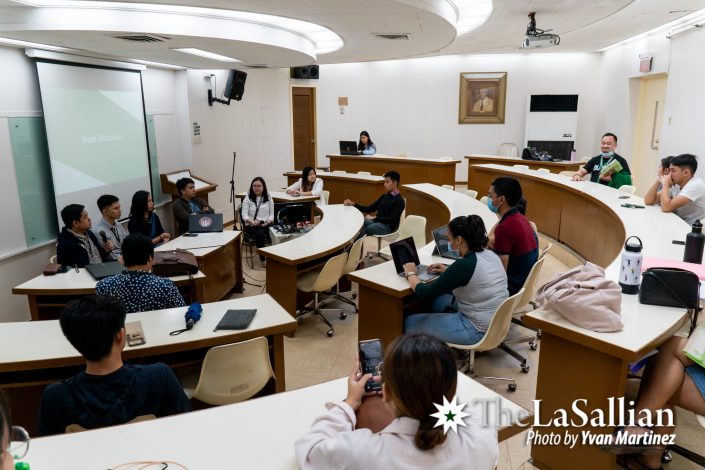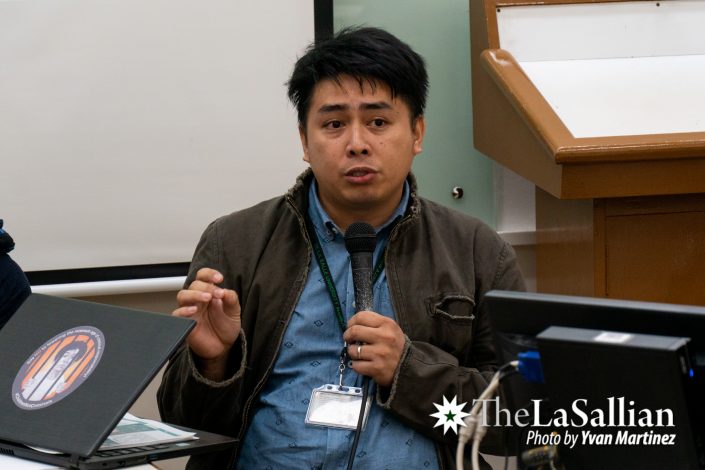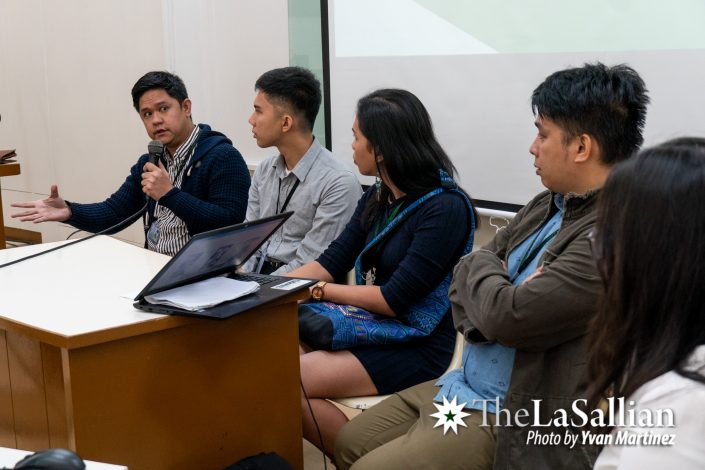Representatives from different organizations met last February 7 at Room L230 of St. La Salle Hall for a panel discussion entitled, A Breakdown on the Proposed Mandatory ROTC Bill and its Effects on the Philippine Youth. Organized by the University Student Government’s Legislative Assembly, the National Union of the Students of the Philippines (NUSP) and the National Service Training Program (NSTP) and Formation Office led the talk on the controversial measure proposed in Congress.

Positive prospect
Albert Tijam, a Legislative Officer from the Office of Sen. Sherwin Gatchalian, explained that the proposed Reserve Officers’ Training Corps (ROTC) bill, or Senate Bill 2232, will provide military training for senior high school (SHS) students. Citing how in times of armed conflict, those of legal age would be automatically conscripted according to the Constitution, he reasoned that, “If that will be the case, what will happen to the 18-year-olds [and] above who are conscripted but [do not have] the necessary skills?”
Gatchalian himself announced in late 2019 that he would sponsor the passage of the said law, making ROTC mandatory for SHS students, following President Rodrigo Duterte’s vocal insistence for its institutionalization in his most recent State of the Nation Address.
Andrew Alimpuangon, a Cadet Officer for the ROTC Program in DLSU, dismissed negative perceptions about the program. He asserted that being a reservist is much more than “just being trained [on] how to use a weapon.” Alimpuangon stressed that those undergoing ROTC are “also being taught values like service and time management. If there’s one important aspect of ROTC, it’s that you are being given team-driven experiences…Walang iwanan dito.”
(No one gets left behind here.)

Rights over everything
On the other hand, NUSP Deputy Secretary General Jandeil Roperos argued against the proposed ROTC bill, baring ROTC’s roots in the Commonwealth and Martial Law eras. “[It was] in response to the political climate during that time,” she said. Instead of teaching patriotism and nationalism, Roperos claimed the program became a breeding ground for corruption and abuse; an exposure of a corruption case caused a cadet’s torture and death during former President Corazon Aquino’s term, causing the development of the other components of NSTP.
Eule Rico Bonganay, Secretary-General of Salinlahi Alliance for Children’s Concerns, agreed with Roperos’ arguments, claiming that the actions of the Duterte administration contradicted with the bill’s supposed goal, especially its China-oriented foreign policy.
Both Bonganay and Roperos argued that a mandatory ROTC program violates laws that prohibit military presence in schools. “We have the Soto-Enrile Accord [where] military presence ay pinagbabawalan sa loob ng universities, colleges, schools because these schools are zones of peace,” Roperos contended. The Soto-Enrile accord is an agreement between the University of the Philippines (UP), the Department of National Defense, and the Department of Interior and Local Government. It was originally signed in 1982 by Sonia Soto and then-Defense Minister Juan Ponce Enrile, and updated in 1989 by the signing of then-UP President Jose Abueva and then-Secretary of National Defense Fidel V. Ramos.
(Military presence is banned in universities, colleges, and schools.)
Bonganay added that Republic Act 7610 or the Anti Child Abuse Law, which affords children enhanced protection from abuse, forbids the military recruitment of minors. He said, “These laws that we have are consistent with international instruments on the protection and promotion of children’s rights.”

Options and opportunities for dialogue
Quizzed on why the proposed measure brought down ROTC to the SHS level, Tijam explained that it was to adjust to the year level changes as 18-year-old students would be in SHS. He added that the ROTC program still provided for exemptions for religious and medical reasons, but that parents’ unwillingness to allow their children is “not a valid reason”.
As a momentary compromise, Bonganay proposed opening more opportunities for talks and further analysis of the bill. “We need to review first to see what was lacking and what else we need to modify so the program can be more effective. Because if not, later on, we would have to adopt newer programs and add to the budget without reviewing what we have previously taken out,” Bonganay shared in Filipino. He also urged the government to take steps to “comprehensively review” the ROTC program which had been abolished “historically dahil doon sa kaniyang mga kaso ng karahasan o pang-aabuso”.
(…due to cases of violence and abuse.)
Correction: February 10, 2020, 9:30 am
The article was updated to correct Jandeil Roperos’ name and affiliation. Her surname is Roperos, not Ramos. She is currently Deputy Sectetary General of NUSP, not Secretary General of SAMASA. The publication apologizes for the error.
